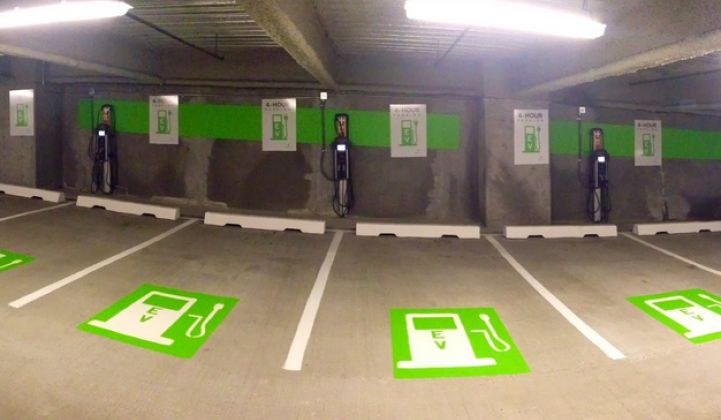It's difficult to own an electric vehicle if you don't own a house and thus lack consistent overnight access to an EV charger. Even with the availability of public and workplace charging, most drivers will want to plug in at home to ensure they have a full charge for the next day.
"In all but the most special cases, people that live in apartments don't buy EVs," in part because home charging is inconvenient or unavailable, said Pasquale Romano, CEO of ChargePoint, one of the world's largest EV charging station operators. "So what you have to do is create a way for the landlord not to have to bear all of the cost. You have to wrap it as a service, much like other things landlords buy for apartment buildings -- like coin-operated laundry -- and that’s what we’ve done.”
Yesterday, ChargePoint announced a new service for condominiums and apartment buildings that provides residents with a dedicated EV charger in their own parking space, with relatively little risk for building owners. In this offering, ChargePoint covers all of the upfront costs of the charger itself, while the landlord is responsible for wiring the EV parking spot. In the past, in order to offer tenants EV charging, the property manager would have to cover all costs out of pocket.
The ChargePoint Multi-Family Home Service consists of a fully installed Level 2 charging station with comprehensive 24/7 support and the ability to allow drivers to manage their charging through a mobile app for $39.99 per month, plus a one-time activation fee. Residents then pay their landlord directly for the electricity they use. According to Romano, apartment building landlords normally pay commercial power rates, which means EV drivers that live in multifamily residences are likely to spend less to charge their cars than would a driver living in a single-family residence.
Property managers and tenants can participate in the ChargePoint program on a month-to-month basis, with no long-term contract. If a resident moves, the charging station is deactivated until another EV-driving resident decides to sign up for the service. Access to EV charging could help landlords attract desirable prospective residents.
"The competitive nature of the multifamily industry lends itself to adapting to consumer needs, and allowing EV owners access to charging in the apartment environment seems a natural evolution. EV owners represent high-quality residents, and facilitating EV use helps us with our sustainability goals. It’s a win-win scenario,” said Rod Standard, development director at the real estate developer Sobrato, in a statement.
For ChargePoint, the new program represents a significant market opportunity. It's estimated that there could be 2.3 million EVs on U.S. roads by 2020, and up to 10 percent of those will be owned by residents of multifamily homes. According to the Department of Energy, 80 percent of EV charging is done at home. (ChargePoint made its first push into the home charging market last year.) Building out stations in apartment buildings could also help increase use on the company's wider charging network, which now offers more than 21,000 places to plug in.
"We are making a bit of an upfront investment, and we think it’s a good one, but more importantly, we want more people to drive EVs because that’s good for everything-- that’s good for our outside-the-home public charging and workplace charging programs as well," said Romano.
EV drivers looking for somewhere to plug in at home could purchase their own Level 2 charger for as little as $450 -- roughly the same price as one year of ChargePoint's multifamily service. But then they'd probably have to buy a house, too.



